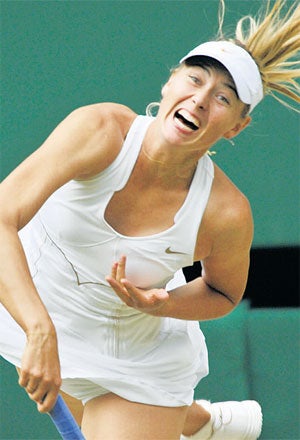Sharapova's big forehand forces the giant-killer into submission rush

Your support helps us to tell the story
From reproductive rights to climate change to Big Tech, The Independent is on the ground when the story is developing. Whether it's investigating the financials of Elon Musk's pro-Trump PAC or producing our latest documentary, 'The A Word', which shines a light on the American women fighting for reproductive rights, we know how important it is to parse out the facts from the messaging.
At such a critical moment in US history, we need reporters on the ground. Your donation allows us to keep sending journalists to speak to both sides of the story.
The Independent is trusted by Americans across the entire political spectrum. And unlike many other quality news outlets, we choose not to lock Americans out of our reporting and analysis with paywalls. We believe quality journalism should be available to everyone, paid for by those who can afford it.
Your support makes all the difference.For the first time since January 2008, Maria Sharapova is in a Grand Slam final. Despite a decidedly shaky start yesterday, the fifth seed dispatched the wild card Sabine Lisicki 6-4, 6-3 in less than an hour and a half on Centre Court, and the British teenager Laura Robson can draw some satisfaction from the knowledge that nobody in these championships has thus far taken more games than she did from Sharapova, whom she forced to a tie-break in the opening set of their second-round match.
Nonetheless, the 2004 champion has not yet dropped a set, and after overhauling a 0-3 deficit yesterday, almost as much by willpower as good tennis, she looked firmly in control against 21-year-old Lisicki, whose early confidence soon wavered under the onslaught of the mighty Sharapova forehand. The Russian's serve, however, was not so mighty. She double-faulted no fewer than 13 times, including the first and last points of her opening service game, to hand an early and doubtless unexpected advantage to her opponent, who then held serve to take that 3-0 lead and had a point for a further break to go 4-0. Sharapova landed only 42 per cent of her first serves in the first set, and although the ratio improved, such inconsistent serving is not usually the stuff of which championships are made.
Lisicki will be duly disappointed not to have capitalised, although in truth there was very little wrong with the rest of Sharapova's game. The German, like Sharapova a resident of Bradenton, Florida, and a product of Nick Bollettieri's academy, only fleetingly reached the heights she scaled in overturning two match points to defeat the No 3 seed Li Na in a tough second-round encounter, and a scrapping Marion Bartoli in the quarter-final. Had she reached the final, Lisicki would have been the first unseeded woman to do so at Wimbledon since Billie Jean Moffitt, as was, in 1963. As it is, she is projected to return to the world's top 30, which after a grievous ankle injury last year, and having plummeted to 218 in the world as recently as March, constitutes a hugely successful couple of weeks at the All England Club.
Success is always hard to quantify in the wake of defeat, however, and for all her progress here, the big-serving Lisicki hardly needed reminding that she failed to send down a single ace in the semi-final, having unleashed 44, more than any other woman, in her previous five matches. Only she and her father, who is also her coach, will know for sure whether her nerve failed her on the big stage.
As for Sharapova, she didn't get to be the world's highest-earning female athlete by suffering from big occasion nerves. Having struggled so badly with her serve she showed her formidable mettle by firing one of two aces of her own to clinch the first set, and after yielding another service game at 3-0 in the second set, broke back immediately. It was during that game that Lisicki, fighting back from 0-40, enjoyed a stroke of outrageous luck, belting a forehand that was heading well wide until a net cord redirected it into play. It is shots like those that have been known to effect dramatic swings of fortune, but not this time. The German saved four break points, but not a fifth, and soon afterwards Sharapova, watched triumphantly by her fiancé Sasha Vujacic, the 6ft 7in shooting guard for the New York Nets, was blowing kisses to a crowd that – with one or two exceptions – had doubtless wished a rather sterner test on her.
She was later asked whether inexperience might have worked to her advantage when she won here as a 17-year-old. She conceded that perhaps it had. "You don't really know what to expect and you almost have that feeling of nothing to lose and you go for it," she said. "I was so thrilled to be in the final. I was down and out in the semis. I was ready to pack my bags and go home. Just happened to rain and I was able to change things round."
This time, a three-times Grand Slam champion and even at 24 comfortably the oldest and most experienced of the four semi-finalists, she knows just what to expect. "Experience is an incredible asset," she said. She will need it if she serves tomorrow like she did yesterday. "I felt like I was rushing things," she said. "I didn't really want to give her too many looks on second serves [but] I think maybe I overthought it too much. My toss was just all over the place."
Nevertheless, she is once again within touching distance of the great prize. "I hadn't been past the fourth round in a few years," she said, "so to be at this stage, I'm just thrilled."
Join our commenting forum
Join thought-provoking conversations, follow other Independent readers and see their replies
Comments